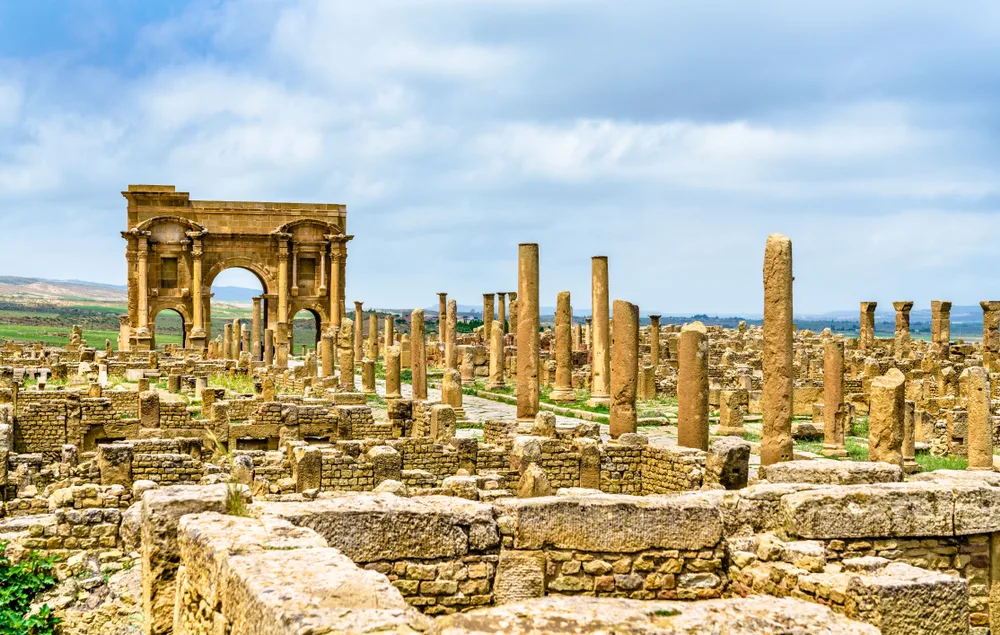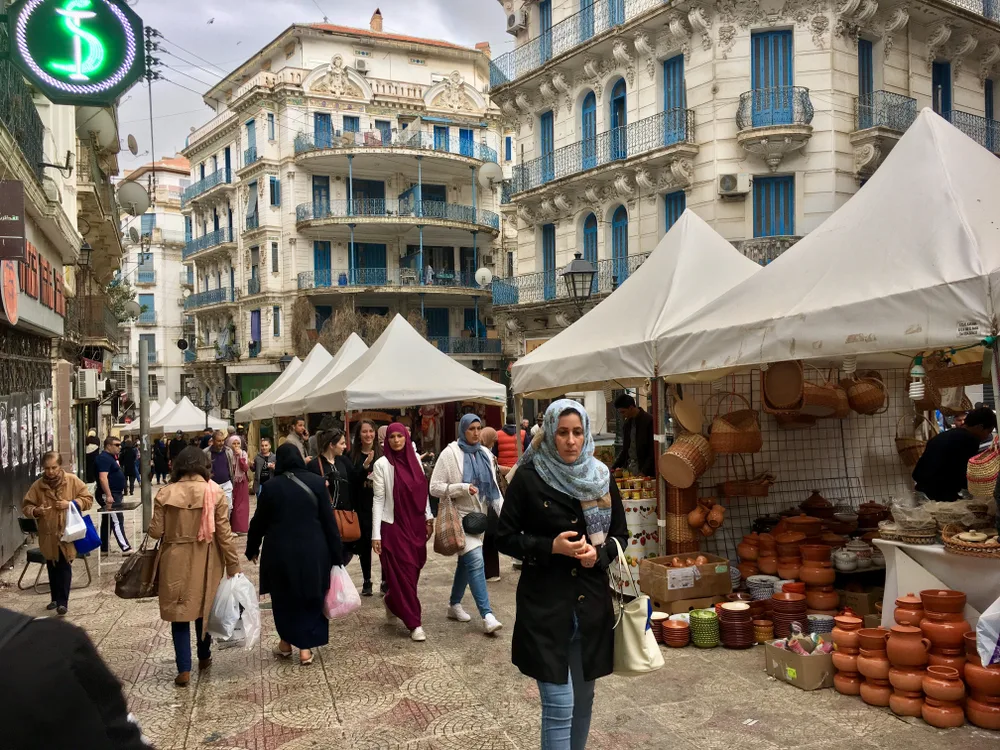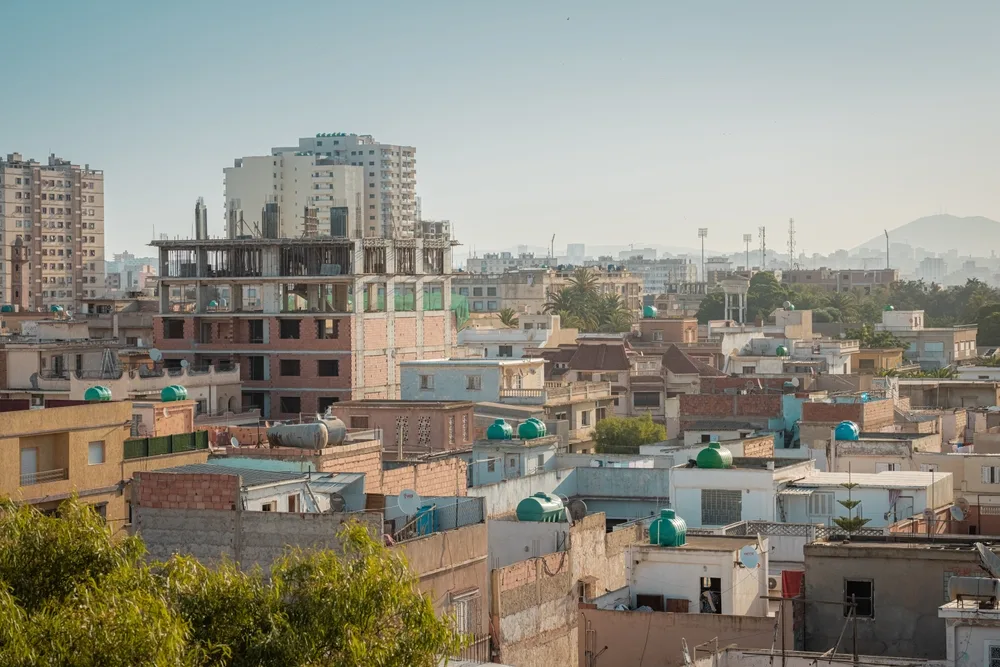Algeria is a country located in North Africa, bordered by Tunisia, Libya, Niger, Mali, Mauritania, Western Sahara, and Morocco. It is the largest country in Africa and the tenth largest in the world.
Algeria is a country with a rich history, and It is home to many ancient ruins and landmarks, including the Roman ruins of Timgad and Djemila, and the Casbah of Algiers, a UNESCO World Heritage Site.
In addition to its historical landmarks, Algeria is also known for its beautiful natural landscapes. The country has a long coastline along the Mediterranean Sea, with stunning beaches and crystal-clear waters. The Sahara Desert also covers a large portion of the country, offering visitors a chance to experience the vast and breathtaking desert landscape.
Other popular tourist destinations in Algeria include the Tassili n’Ajjer National Park, which is home to many unique rock formations and prehistoric cave paintings, and the Hoggar Mountains, which offer visitors a chance to hike and explore the beautiful mountainous terrain.
In terms of cuisine, Algeria is known for its flavorful and diverse dishes, which are influenced by its history and culture. Some popular Algerian dishes include couscous, brik, and tajine.
Overall, Algeria offers visitors a unique and unforgettable travel experience, with its rich history, stunning natural beauty, and delicious cuisine.
Risks of Traveling to Algeria

OVERALL RISK: HIGH
You should know right from the start that Algeria is a country wracked by terrorism and that terrorist troupes are still the cause of fear in this North African country. Having said this, Algeria still has tourism and it is possible to visit and travel through the region without consequences.
TRANSPORT & TAXIS RISK: MEDIUM
Transport is not that safe in Algeria, as tourists using public transport will stand out and other people will be watching you, on the streets and especially on buses, trains, etc. Make sure you don’t fall asleep while traveling on public transport, as you might wake up with empty hands. Pickpocketing on buses and trains is also common.
PICKPOCKETS RISK: MEDIUM
Like in most developing countries, petty theft and pickpocketing are widespread in Algeria. Make sure you don’t flash your valuables and generally don’t look like you’re wealthy. Dangling cameras, flashing money or credit cards or expensive jewelry is strongly recommended against.
NATURAL DISASTERS RISK: MEDIUM
The situation is not serious in Algeria when it comes to natural disasters. Some parts of Algeria are susceptible to severe floods that cause substantial material damage. Northern Algeria is located in a seismically active zone.
MUGGING RISK: HIGH
Violent crime exists in Algeria and has been on the rise lately. Muggings are quite common and criminals are particularly active after dark. It’s best to avoid dark streets and deserted areas when night falls.
TERRORISM RISK: HIGH
This is the sore spot of Algeria. Terrorists are very likely to try to carry out attacks in Algeria, including kidnappings. The biggest threat comes from Al Qaeda in the Islamic Maghreb and other regional Islamist groups like Al Murabitun and Daesh affiliates. These groups have been active across the country and are a threat throughout Algeria.
SCAMS RISK: HIGH
There are many scams in Algeria, one of the most popular being the tour guide scam, where men pose as tour guides and are actually just con artists trying to get your hands on your money. Be wary of people trying to distract you in order to steal from you and of taxi drivers overcharging you for a ride. We advise you to be extremely careful when handling money and around ATMs.
WOMEN TRAVELERS RISK: MEDIUM
Algeria is mostly safe for women to travel to, but it is still advised to go out accompanied at night. Be sure to avoid remote streets, both during the day and night and do not flash your belongings or handle money in public.
How Safe Is Algeria Really?

Even though you will read many warnings about Algeria’s safety, concerning its political situation, things are getting better and better in this country.
After the civil wars, terrorism in 2005 was focused only on areas such as wooded mountains and near the Libyan or Malian borders, where the attacks were caused by the war in those two countries.
Nowadays, security is patrolling these areas, making sure the visitors to these areas are safe, though tourists should be cautious when visiting these areas.
What truly might be problematic for tourists is the terrorism that is still present in the country’s south where Algerian terrorist troupes have been trying to overthrow the Algerian government for years.
Known as Al-Qaeda in the Islamic Maghreb, the group has caused numerous attacks in the country, and the scariest thing is that they’ve publicly stated foreigners as their targets.
But this isn’t the biggest problem for the Westerners visiting Algeria: kidnappings are, and they’re widespread.
If you’re a tourist, it is best to avoid zones near northern Mali, Niger, Western Sahara, and Mauritania as kidnappings and killings have been reported as recently as 2011.
Suicide attacks are also common in this country.
Tourists are highly recommended against traveling anywhere after dark.
Avoid cars, and minor roads and if you do venture somewhere during nightfall and wind up unsure about your whereabouts, don’t hesitate to ask the police for some advice.
Things to Consider
- Visas – A small number of countries can enter Algeria without a visa, and UK citizens can purchase a visa upon arrival. Make sure your passport is valid for at least six months past the date of entry into Algeria. If you are not sure about your visa status, visit www.doyouneedvisa.com which will let you know whether or not you need a visa based on your nationality and the country you want to visit.
- Currency – Algerian dinar is the official currency in Algeria. There are banks all over major cities and most now have ATMs that work with foreign cards.
- Weather – The largest country in Africa, Algeria, has three types of climate: the mild Mediterranean climate on the coast, the transitional climate typical for the northern hills and mountains, characterized by a bit more rainy weather and the desert climate in the vast area of the Sahara desert.
- Airports – Houari Boumediene Airport sometimes referred to as Algiers International Airport, is the international airport serving Algiers, the capital of Algeria. It is located about 16.9 km southeast of the city.
- Travel Insurance – Just like anywhere else, we recommend getting travel insurance when traveling to Algeria, since it covers not only the costs of medical problems but also theft and loss of valuables.
Frequently Asked Questions

Before visiting Algeria, you might want to know the answers to some of these questions as well:
Why is there no tourism in Algeria?
Despite all that it has to offer, Algeria has no tourism industry, especially compared to Morocco or Egypt. One reason is that the government hasn’t invested much in tourism since the country gets most of its wealth from oil. All other industries, including tourism, didn’t receive much support.
Are Algerian people friendly?
Yes, the Algerian people are friendly. Most people are excited to meet foreigners that want to get to know their country, especially since so few foreigners arrive. Algerians are famous for their hospitality and welcoming culture.
Is Algeria safe for female tourists?
Visiting Algeria is definitely tougher as a woman than as a man. Cultural norms are much more conservative, and there are high rates of sexual harassment. While many women travel to Algeria and have great experiences, if you’ve never traveled to a Middle Eastern or North African country before, it is not a great first destination.
Can you drink alcohol in Algeria?
Almost all Algerians are Muslim, and alcohol is banned in Islam. There is some local alcohol production, mostly craft beer and traditional wine, that you can find in sketchy bars and hotel restaurants. You can drink alcohol, but access to it is limited and completely banned during Ramadan.
What should I avoid in Algeria?
Avoid traveling to border areas that are unsafe due to the terrorism risk. Avoid traveling in rural areas on your own and avoid breaking local rules. Make sure to read local laws and regulations carefully.



